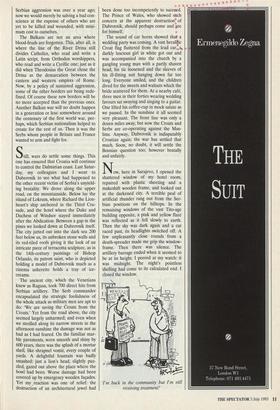RECOVERY AMONG THE RUINS
end of the war in Bosnia, and suggests we accept whatever brutal solution emerges
Sarajevo IT HAS BEEN a comparatively quiet evening here. That is to say, the mortar shells are landing at intervals of no closer than ten minutes or so, and only a few of them are near enough to interrupt the conversation in my room, or make the lit- ter of objects on my desk — torch, keys, a silver good-luck charm of the Indian god Ganesh — rattle with the vibration. There is a nastier sound than the mortars: it comes from a high-performance automatic weapon which its proud users here call 'the death-spreader'. Three hours ago one of them spread a little more death, when a Turkish journalist who was not yet 20 took a round from a death-spreader in the chest. It went straight through his flak jacket. He had been photographing the funeral of some boys six years younger
than himself, who had been killed as they gathered round a game of chess.
This is nothing more than the daily attri- tion of a vicious little war: the fourth, or maybe the fifth, Balkan war in the last 120 years, depending on how you count these things. The Serbs are responsible for most of the attrition, but Muslims and Croats enthusiastically fulfil their quotas too. One of the more foolish responses in the West has been to believe that there is one uniquely evil aggressor here, and one uniquely innocent set of victims. The civil- ians are indeed innocent, but the armed men who fight for them rarely are. Most of us instinctively sympathise with the inhabitants of Sarajevo, who are Serbs and Croats as well as Muslims, and feel that if only this little scale-model of the old inte- grated Yugoslavia had been left alone, it would have provided an alternative to the savage approach of the warlords.
Yet away from the civilised atmosphere in Sarajevo, all sorts of other savageries have been going on in Bosnia. The last time I was here, the UN forces discovered an underground pipe three feet high and 20 feet long, where soldiers had been kept prisoner for three months. They saw the light of day only when they were taken out for torture or beating. The prisoners were Serbs, their captors Muslims. If it had been the other way round, the case would have received vastly greater attention interna- tionally. This doesn't lessen the guilt of Serbia's leadership for having let loose so much evil, but it is a reminder that savagery is natural to the conflict: it hasn't simply been invented by Serbs. This area is part of Europe only by a geographical technicality; historically, spiritually, much of it belongs to what we used to call, much more accu- rately, the Near East.
Outside, the artillery has taken on the regular sound of a thunderstorm. Here at the Holiday Inn we are safe enough, but some people — Serbs, Croats as well as Muslims — are suffering badly as the dark- ness grows. Dogs are barking hysterically, and a few frightened drivers gun up their engines to get past the danger-points in Snipers' Alley. As I sit here, flinching at the louder explosions, it is hard to believe there can really be people who want more artillery and more death-spreaders to be sent here in order to even out the odds and lengthen the war. They call it 'arming the Muslims'. But the time to have stopped Serbian aggression was over a year ago; now we would merely be salving a bad con- science at the expense of others who are yet to be killed and wounded, with mini- mum cost to ourselves.
The Balkans are not an area where blood-feuds are forgotten. This, after all, is where the line of the River Drina still divides Catholics, who read and write a Latin script, from Orthodox worshippers, who read and write a Cyrillic one; just as it did when Theodosius the Great chose the Drina as the demarcation between the eastern and western empires of Rome. Now, by a policy of sustained aggression, some of the other borders are being rede- fined. Of course these new borders will be no more accepted than the previous ones. Another Balkan war will no doubt happen in a generation or less: somewhere around the centenary of the first world war, per- haps, which Serbian nationalism helped to create for the rest of us. Then it was the Serbs whom people in Britain and France wanted to arm and fight for.
Still, wars do settle some things. This one has ensured that Croatia will continue to control the Dalmatian coast. Last Satur- day, my colleagues and I went to Dubrovnik to see what had happened to the other recent victim of Serbia's unyield- ing brutality. We drove along the upper road, on the mountainside. Below lay the island of Lokrum, where Richard the Lion- heart's ship anchored in the Third Cru- sade, and the hotel where the Duke and Duchess of Windsor stayed immediately after the Abdication. Between a gap in the pines we looked down at Dubrovnik itself. The city jutted out into the dark sea 200 feet below us, its unbroken stone walls and its red-tiled roofs giving it the look of an intricate piece of terracotta sculpture, as in the 14th-century paintings of Bishop Orlando, its patron saint, who is depicted holding a model of Dubrovnik much as a cinema usherette holds a tray of ice- creams.
The ancient city, which the Venetians knew as Ragusa, took 700 direct hits from Serbian artillery. The Serb commander encapsulated the strategic foolishness of the whole attack as military men are apt to do: 'We are saving the Croats from the Croats.' Yet from the road above, the city seemed largely unharmed; and even when we strolled along its narrow streets in the afternoon sunshine the damage was not as bad as I had feared. On the familiar mar- ble pavements, worn smooth and shiny by 600 years, there was the splash of a mortar shell, like shrapnel vomit, every couple of yards. A delightful fountain was badly smashed: just a lion's head, slightly puz- zled, gazed out above the place where the bowl had been. Worse damage had been covered up by emergency wooden façades. Yet my Jeaction was one of relief: the destruction of an architectural jewel had been done too incompetently to succeed. The Prince of Wales, who showed sttch concern at the apparent destruction of Dubrovnik, should perhaps come and iee for himself. 1 The sound of car horns showed that a wedding party was coming. A vast herahlic Croat flag fluttered from the lead car„a. darkly luscious girl in white got out and was accompanied into the church by a gangling young man with a partly shaven head, his tie loosened and the sleeves of his ill-fitting suit hanging down far too long. Everyone smiled, and the children dived for the sweets and walnuts which the bride scattered for them. At a nearby café, three men in their forties wearing wedding favours sat swaying and singing to a guitar. One lifted his coffee-cup in mock salute as we passed. In the sunshine it all seemed very pleasant. The front line was only a dozen miles away, but now the Croats and Serbs are co-operating against the Mus- lims. Anyway, Dubrovnik is indisputably Croatian again; the war has settled that much. Soon, no doubt, it will settle the Bosnian question too; however brutally and unfairly.
Now, here in Sarajevo, I opened the shattered window of my hotel room, repaired with plastic sheeting and a makeshift wooden frame, and looked out at the darkened city. A terrible peal of artificial thunder rang out from the Ser- bian positions on the hilltops. In the remaining windows of the vast Tito-age building opposite, a pink and yellow flare was reflected as it fell slowly to earth. Then the sky was dark again and a car raced past, its headlights switched off. A few unpleasantly close rounds from a death-spreader made me grip the window- frame. Then there was silence. The artillery barrage ended when it seemed to be at its height. I peered at my watch: it was midnight. The night's pointless shelling had come to its calculated end. I closed the window.
'I'm back in the community but I'm still receiving treatment!'



















































 Previous page
Previous page